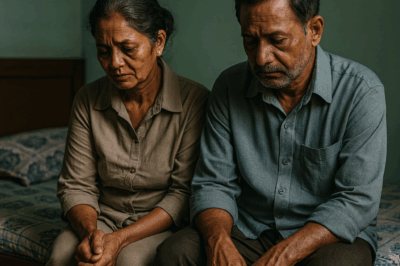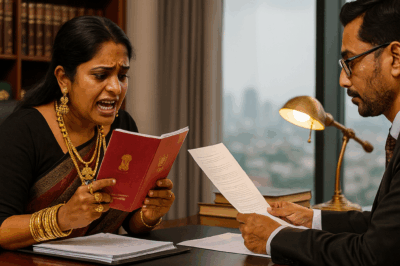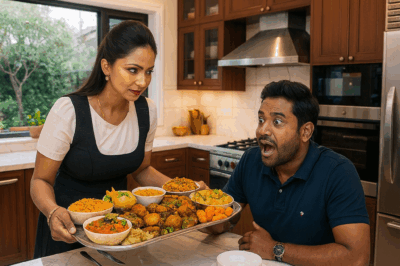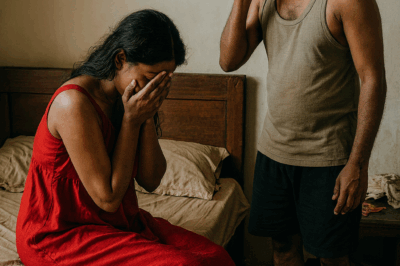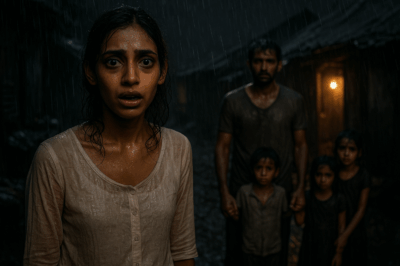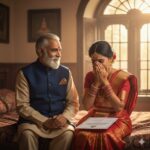Before my sister’s wedding day, my future brother-in-law suddenly collapsed while trying on his wedding suit. After a series of urgent tests, the hospital called my parents aside: He had terminal liver cancer.

Both families were devastated. My sister, who was about to wear her wedding lehenga, cried almost to the point of madness. My mother cried… but her tears weren’t for my sister, but for the huge dowry the groom’s family had presented just the day before.
My father just mumbled: “It’s fine if we found out after the wedding… but if we cancel now, our family will lose face with the whole village!” And so… they looked at me. “You’re still young, you don’t have a boyfriend, sacrifice for your sister… Just get married, and if he passes away a few months later, it’ll be over.” I couldn’t believe my ears. I wasn’t an item to be exchanged. I didn’t love him. I didn’t want to marry a man waiting to die.
But… the pressure from the entire family, from my mother kneeling and begging, from my father’s fear of losing face, from my sister curled up in her room with the prescription for my future brother-in-law’s treatment, I… gritted my teeth and nodded. I married my brother-in-law instead of my sister. The wedding night.
The room smelled of jasmine, but I only felt suffocated. He — now my husband — lay silent like a half-dead man. He knew he was about to die. I didn’t blame him. I blamed this house, this society, this cruel heartlessness that could push me into a wedding like pushing an object into a pyre. And I had prepared beforehand.
Exactly at 11 PM, while the whole family was still celebrating in the courtyard below, I pulled something out of my wedding lehenga pocket: A folder of photocopied medical certificates clearly stating his illness, along with a USB containing an audio recording of my parents’ conversation, pressuring me to marry to “save the family’s honor.” I pressed a button. The TV screen in the living room below lit up. The whole family turned around.
My mother stood frozen. Her voice echoed in the recording: “Just let her marry him instead; if she becomes a widow in a few months, she’ll get more compensation than her sister!” People started whispering. The groom’s family seemed frozen.
I appeared on the staircase, still in my white wedding lehenga. I looked at my mother: “From today, I am no longer your daughter. And this marriage, tomorrow I will go to court and declare it invalid, because I did not give my free consent.” “He might die. But I will not die with silence.” The next morning, I disappeared from the village in regular clothes. Leaving behind a family shattered by the exposed truth. Three months later, I received a call: he had indeed passed away. But before he left, he asked someone to send me a letter: “Thank you for not staying silent. Thank you for showing me that, even at the end of life, there’s still someone who dares to live truthfully.”
News
At 61, I remarried my first love. On our wedding night, as I took off my wife’s traditional dress, I was startled and pained to see…
I am Arjun, 61 years old this year. My first wife passed away 8 years ago from a serious illness….
30 minutes later, my sister was stunned when our family called with news:
My younger brother, the youngest in our family, is only 37. Unmarried and without children, he just bought a piece…
Thinking my stay-at-home wife was a spendthrift, I pretended to go bankrupt to teach her a lesson. To my surprise, that evening she brought dinner to the table and made an announcement that sent a chill down my spine…
I’m a businessman, and my wife, Priya, stays at home to take care of our two young children. Every month,…
In the middle of the night, a son-in-law called his father-in-law and told him to take his daughter back and “re-educate” her. 15 minutes later, the father-in-law arrived with something that left his son-in-law speechless…
It was nearly midnight, with a light drizzle falling outside. In the cold living room, the atmosphere was as tense…
On the day I found out I was pregnant, his mother brought me 20 lakh rupees and told me to break up. I took the money and left without a word. Eight months later, I fainted in the delivery room when I saw…
I never thought that the doctor who delivered my baby would be my ex-boyfriend, Rohan. The child in my womb,…
A poor young woman gives shelter to a man and his four children on a rainy night — what he does next leaves her completely shocked and stunned…
That night, the rain poured down relentlessly. A biting cold wind whipped violently against the small, dilapidated house at the…
End of content
No more pages to load

